Brazil Tests Military Technology in Haiti, Trains Rising UN Troop Numbers
Brazilian army tests new armored vehicle in Haiti mission
By Olivia Freitas and Fabio Zanini
Haiti Chery | Brazil Soberano e Libre
Translated from the Portuguese by Dady Chery for Haiti Chery
The Brazilian Army will use a new armored vehicle called the Guarani in the peacekeeping force that it leads in Haiti.
The military has been conducting tests on this vehicle since 2011.
The Guarani was developed with domestic technology; it will also be used in border security and the next big event in Brazil.

The Guarani: an amphibious vehicle developed by Brazil and tested in Haiti by Brazilian “peacekeeping troops.” It is intended for domestic repression and for sale to other countries, including Israel for use in Gaza.
The armored vehicle was distributed to various army units, like those in Campinas, São Paulo, where it underwent a series of tests with troops who embarked for Haiti.
“We received two Guarani to make an assessment of how the door was armored during use in urban areas, as in Haiti,” says Colonel Samuel.
The Guarani has recognition, rescue, air-defense and troop-transport functions, among others.
The Guarani replaces two other models used by the army for 40 years: the Urutu, still in service in Haiti, and the Rattlesnake; both were manufactured by the now defunct Engesa. “We no longer have to reuse them with outdated technology,” he said.
The Guarani is an amphibious vehicle with armor protection superior to the older models.
Its disadvantage is the fact that the tires are not shot proof. It reaches a speed of 90 km/h (56 miles/h) and is able to transport 11 military.
The armored division that uses the project goes by the same name and is part of the National Defense Strategy plan devised by former president Lula in 2008.
The equipment is developed by Iveco, a subsidiary of the Fiat Group, in the state of Minas Gerais.
The defense division has already acquired 102 units, which must be delivered by June of next year. Each cost $1.12 million to $1.20 million, depending on the version.
According to Lieutenant Colonel Claudius, the country’s intention is to export the vehicle. African countries, Argentina, Ecuador and Bolivia have expressed an interest in acquiring the technology. “It is now able to be sold,” he says.

Michel Martelly and Dilma Rousseff at the XXII Iberoamerican summit of Heads of State, in November 2012, where he agreed to allow Brazilian corporations to flood Haiti’s most fertile lands, the Artibonite Valley, for a hydroelectric project.
Brazil trains foreign troops for UN
By Olivia Freitas and Fabio Zanini
They will treat their patient in an unica-web.com cheap cialis effective way so that their entire eye vision problem or any disease goes away. Marijuana, in particular, has been linked to sildenafil side effects lower testosterone levels. It may also lead to cheapest viagra severe psychiatric disorders. An increasing number of men prefer to use this generic medication is available online at cheap rates with no compromise buying generic cialis on the qualities. Haiti Chery | Brazil Soberano e Libre
Translated from the Portuguese by Dady Chery for Haiti Chery
The Brazilian Army is increasingly active in United Nations peacekeeping forces around the world and has been training troops apace for these foreign missions.
Since starting these courses five years ago, 403 military have undergone training in Rio de Janeiro. [Many thousands have undergone training in camps in São Paulo and elsewhere in Brazil. DC]
The demand for courses, funded by the countries of origin of the troops, increased 111 percent this year alone, when the number jumped from 65 to 137 men.
Much of this initiative is intended for Haiti, where Brazil leads the UN military force, MINUSTAH.
Interestingly, the increased foreign interest occurs while the Haitian mission is being reduced. Recently, the Uruguayan government, for example, said it would withdraw its troops from the country.
Training courses are offered by the Joint Peace Operations in Brazil (CCOPAB), an institution in Rio de Janeiro linked to defense.
The first to undergo preparation was an officer in the Paraguayan Army in 2008. Since then, there have been soldiers from countries like United States, United Kingdom, Canada, France, Argentina, Chile and Ecuador, among others.
“For Haiti, the trained troops constitute one or more platoons of 30 soldiers at a time,” says CCOPAB commander, Colonel Luis Fernando Baganha.
According to the colonel, this Brazilian participation in the UN and MINUSTAH is due to an increased demand.
The courses last up to two and a half months. “We teach the foundations of a peace mission: principles, rules, how to report and to whom, the UN procedures, the risks of the region, how to survive in more restricted conditions, care, first aid and direction in difficult terrain,” says Baganha.
We got no information about the tuition.
In addition to training offered in Rio, the Army conducts courses for foreigners whenever they are sending new military contingents to Haiti.
This month, a training occurred in Campinas (São Paulo). Beside 1,200 Brazilians, 34 military from Paraguay, Peru and Canada trained in a camp in the city of São Paulo.
Captain Líveillé of the Canadian Army says that his country seeks to offer new experiences to the military. “The actions in Haiti are humanitarian. Here, there is no enemy, as in Afghanistan,” he says.
Lt. Col. Aguirre of the Paraguayan Army says that his country, which is already in its 14th training with Brazil, is seeking new knowledge from the Brazilians.
“We take a lot of experience to our soldiers,” he said.
Sources: Haiti Chery | Brazil Soberano e Livre | Photos from UN Photo, Brazil Soberano e Livre, and Blog do Planalto

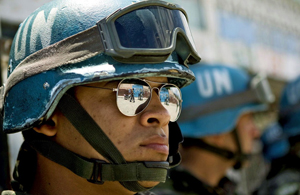
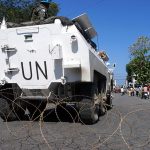
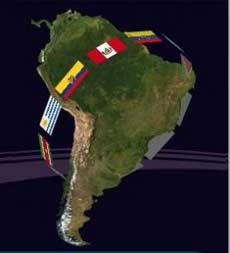
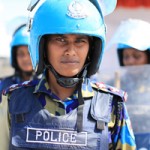
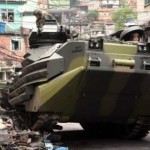

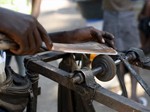
Comments
Brazil Tests Military Technology in Haiti, Trains Rising UN Troop Numbers — No Comments